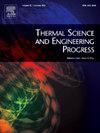A thermo-economic comparison on new and conventional alternatives of pressurization of CO2 in CCS systems
IF 5.1
3区 工程技术
Q2 ENERGY & FUELS
引用次数: 0
Abstract
The final stage of carbon capture and storage processes involves the pressurization of CO2 by a suitable method which is conventionally carried out through a series of compressors with intercoolers in between them. In the present study, the idea of liquefying the captured CO2 is considered. Four different systems for the liquefaction process are evaluated and compared Thermo-economically with the benchmark system of direct carbon dioxide compression. The results indicate that the EPLS system outperforms the others, with a product cost 5.89% lower than the benchmark system. Evaluations show that most of the costs are imposed by the initial compression stage in each system. A detailed investigation of the sensitivity analysis shows that the benchmark and claude systems have the largest dependency on pressure ratio and intercooling temperature, respectively. Additionally, evaluation of the economic parameters indicates that the changes in unit cost of power have the most effect on the benchmark system while the interest rate affects the results of claude and DEBARS more than other options. Detailed evaluations reveal that the EPLS layout has the advantage of less dependency on the changes of operating parameters and on the other hand, the cost of input heat, the maintenance factor, and the generator and evaporator temperatures make a high difference in the final product cost of the DEBARS. Finally, the effect of pressure drops in heat exchangers is investigated and results reveal that the consideration of pressure drops leads to power penalties ranging from 0.97 to 8.52 $/hr in different systems.
二氧化碳捕获和封存系统中二氧化碳加压的新型和传统替代方法的热经济比较
碳捕集与封存工艺的最后阶段是采用适当的方法对二氧化碳进行加压,传统的加压方法是通过一系列压缩机和中间冷却器来实现的。本研究考虑了将捕获的二氧化碳液化的想法。对液化过程的四种不同系统进行了评估,并与直接压缩二氧化碳的基准系统进行了热经济学比较。结果表明,EPLS 系统优于其他系统,其产品成本比基准系统低 5.89%。评估表明,每个系统的大部分成本都是由初始压缩阶段造成的。对敏感性分析的详细研究表明,基准系统和克劳德系统分别对压力比和中间冷却温度具有最大的依赖性。此外,对经济参数的评估表明,单位电力成本的变化对基准系统的影响最大,而利率对 claude 和 DEBARS 系统结果的影响大于其他方案。详细评估表明,EPLS 布局的优点是对运行参数变化的依赖性较小,而另一方面,输入热量成本、维护系数以及发电机和蒸发器温度对 DEBARS 最终产品成本的影响很大。最后,研究了热交换器压降的影响,结果表明,在不同的系统中,考虑压降会导致 0.97 至 8.52 美元/小时的功率损失。
本文章由计算机程序翻译,如有差异,请以英文原文为准。
求助全文
约1分钟内获得全文
求助全文
来源期刊

Thermal Science and Engineering Progress
Chemical Engineering-Fluid Flow and Transfer Processes
CiteScore
7.20
自引率
10.40%
发文量
327
审稿时长
41 days
期刊介绍:
Thermal Science and Engineering Progress (TSEP) publishes original, high-quality research articles that span activities ranging from fundamental scientific research and discussion of the more controversial thermodynamic theories, to developments in thermal engineering that are in many instances examples of the way scientists and engineers are addressing the challenges facing a growing population – smart cities and global warming – maximising thermodynamic efficiencies and minimising all heat losses. It is intended that these will be of current relevance and interest to industry, academia and other practitioners. It is evident that many specialised journals in thermal and, to some extent, in fluid disciplines tend to focus on topics that can be classified as fundamental in nature, or are ‘applied’ and near-market. Thermal Science and Engineering Progress will bridge the gap between these two areas, allowing authors to make an easy choice, should they or a journal editor feel that their papers are ‘out of scope’ when considering other journals. The range of topics covered by Thermal Science and Engineering Progress addresses the rapid rate of development being made in thermal transfer processes as they affect traditional fields, and important growth in the topical research areas of aerospace, thermal biological and medical systems, electronics and nano-technologies, renewable energy systems, food production (including agriculture), and the need to minimise man-made thermal impacts on climate change. Review articles on appropriate topics for TSEP are encouraged, although until TSEP is fully established, these will be limited in number. Before submitting such articles, please contact one of the Editors, or a member of the Editorial Advisory Board with an outline of your proposal and your expertise in the area of your review.
 求助内容:
求助内容: 应助结果提醒方式:
应助结果提醒方式:


